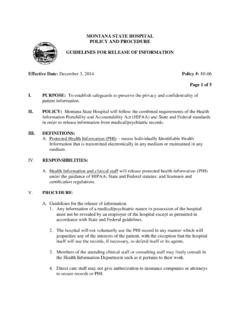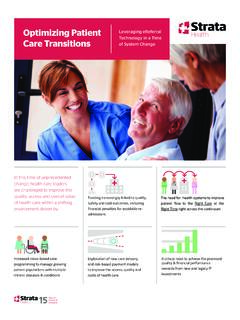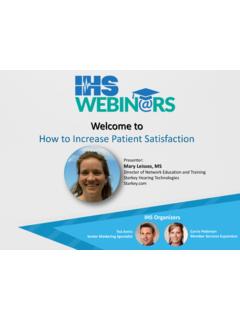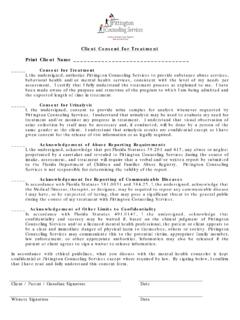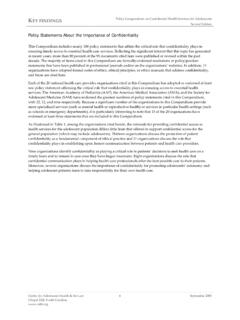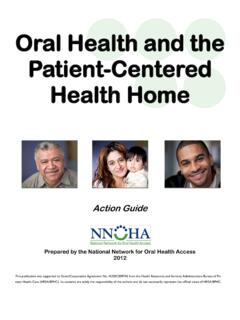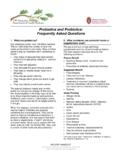Transcription of PATIENT HEALTH QUESTIONNAIRE (PHQ-9) - …
1 PATIENT HEALTH QUESTIONNAIRE (PHQ-9)DATE:NAME:Over the last 2 weeks, how often have you beenbothered by any of the following problems?Not at allSeveraldaysMore thanhalf thedaysNearlyevery day(use " " to indicate your answer)0123 Little interest or pleasure in doing down, depressed, or falling or staying asleep, or sleeping too tired or having little appetite or bad about yourself or that you are a failure orhave let yourself or your family concentrating on things, such as reading thenewspaper or watching or speaking so slowly that other people couldhave noticed. Or the opposite being so figety orrestless that you have been moving around a lot morethan that you would be better off dead, or ofhurting columns++TOTAL:(Healthcare professional: For interpretation of TOTAL,please refer to accompanying scoring card).
2 Not difficult at allIf you checked off any problems, how difficulthave these problems made it for you to doyour work, take care of things at home, or getalong with other people? difficultVery difficultExtremely difficultCopyright 1999 Pfizer Inc. All rights reserved. Reproduced with permission. PRIME-MD is a trademark of Pfizer 10-04-2005 PHQ-9 PATIENT Depression QUESTIONNAIRE For initial diagnosis: 1. PATIENT completes PHQ-9 Quick Depression Assessment. 2. If there are at least 4 3s in the shaded section (including Questions #1 and #2), consider a depressive disorder. Add score to determine severity. Consider Major Depressive Disorder - if there are at least 5 3s in the shaded section (one of which corresponds to Question #1 or #2) Consider Other Depressive Disorder - if there are 2-4 3s in the shaded section (one of which corresponds to Question #1 or #2) Note: Since the QUESTIONNAIRE relies on PATIENT self-report, all responses should be verified by the clinician, and a definitive diagnosis is made on clinical grounds taking into account how well the PATIENT understood the QUESTIONNAIRE , as well as other relevant information from the PATIENT .
3 Diagnoses of Major Depressive Disorder or Other Depressive Disorder also require impairment of social, occupational, or other important areas of functioning (Question #10) and ruling out normal bereavement, a history of a Manic Episode (Bipolar Disorder), and a physical disorder, medication, or other drug as the biological cause of the depressive symptoms. To monitor severity over time for newly diagnosed patients or patients in current treatment for depression: 1. patients may complete questionnaires at baseline and at regular intervals (eg, every 2 weeks) at home and bring them in at their next appointment for scoring or they may complete the QUESTIONNAIRE during each scheduled appointment.
4 2. Add up 3s by column. For every 3: Several days = 1 More than half the days = 2 Nearly every day = 3 3. Add together column scores to get a TOTAL score. 4. Refer to the accompanying PHQ-9 Scoring Box to interpret the TOTAL score. 5. Results may be included in PATIENT files to assist you in setting up a treatment goal, determining degree of response, as well as guiding treatment intervention. Scoring: add up all checked boxes on PHQ-9 For every 3 Not at all = 0; Several days = 1; More than half the days = 2; Nearly every day = 3 Interpretation of Total Score Total Score Depression Severity 1-4 Minimal depression 5-9 Mild depression 10-14 Moderate depression 15-19 Moderately severe depression 20-27 Severe depression PHQ9 Copyright Pfizer Inc.
5 All rights reserved. Reproduced with permission. PRIME-MD is a trademark of Pfizer Inc. A2662B 10-04-2005 Edinburgh Postnatal Depression Scale (EPDS) for Postpartum DepressionThe Edinburgh Postnatal Depression Scale (EPDS) was developed in 1987 for screening postpartum women in outpatient, home visiting settings, or at the 6-8 week postpartum examination. It has been utilized among numerous populations, including US women and Spanish-speaking women in other coun-tries. The scale has since been validated, and evidence from a number of research studies has confirmed the tool to be both reliable and sensitive in detecting depression. The EPDS consists of 10 questions and can usually be completed in less than 5 minutes.
6 Validation stud-ies have utilized various threshold scores in determining which women were positive and in need of refer-ral. Cut-off scores range from 9 to 13 points. A woman scoring 9 or more points or indicating any suicidal ideation that is, she scores 1 or higher on question #10 should be referred immediately for follow-up. The EPDS score should not override clinical judgment. A careful clinical assessment should be carried out to confirm the diagnosis. The scale indicates how the mother has felt during the previous week. In doubt-ful cases it may be useful to repeat the tool after 2 weeks. The scale will not detect mothers with anxiety neuroses, phobias, or personality 1, 2, and 4 (without an *) are scored 0, 1, 2, or 3, with the top box scored as a 0 and the bottom box scored as a 3 and 5-10 (marked with an *) are reverse-scored, with the top box scored as a 3 and the bot-tom box scored as score: 30 Possible depression: 10 or higherAlways look at Question #10, which indicates suicidal thoughtsINSTRUCTIONS1.
7 The mother is asked to underline 1 of 4 possible responses that comes the closest to how she has been feeling the previous 7 All 10 items must be Care should be taken to avoid the possibility of the mother discussing her answers with The mother should complete the scale herself, unless she has limited English or has difficulty with Postnatal Depression Scale (EPDS) Form*In the past 7 days:1. I have been able to laugh and see the funny side of things As much as I always could Not quite so much now Definitely not so much now Not at all2. I have looked forward with enjoyment to things As much as I ever did Rather less than I used to Definitely less than I used to Hardly at all*3.
8 I have blamed myself unnecessarily when things went wrong Yes, most of the time Yes, some of the time Not very often No, never4. I have been anxious or worried for no good reason No, not at all Hardly ever Yes, sometimes Yes, very often*5. I have felt scared or panicky for no very good reason Yes, quite a lot Yes, sometimes No, not much No, not at all*6. Things have been getting on top of me Yes, most of the time I haven t been able to copeat all Yes, sometimes I haven t been coping as well as usual No, most of the time I have coped quite well No, I have been coping as well as ever*7. I have been so unhappy that I have had difficulty sleeping Yes, most of the time Yes, sometimes Not very often No, not at all*8.
9 I have felt sad or miserable Yes, most of the time Yes, quite often Not very often No, not at all*9. I have been so unhappy that I have been crying Yes, most of the time Yes, quite often Only occasionally No, never*10. The thought of harming myself has occurred to me Yes, quite often Sometimes Hardly everName _____ Address: _____ Your Date of Birth _____ _____Baby s Date of Birth: _____ Phone: _____SAMPLE QUESTION:As you are pregnant or have recently had a baby, we would like to know how you are feeling. Please check the answer that comes closest to how you have felt IN THE PAST 7 DAYS, not just how you feel is an example, already completed.
10 I have felt happy: Yes, all the time Yes, most of the time No, not very often No, not at allThis would mean: I have felt happy most of the time during the past week. Please complete the other questions in the same way. Administered/Reviewed by _____ Date _____*Source: Cox JL, Holden JM, Sagovsky R. Detection of postnatal depression: development of the 10-item Edinburgh Postnatal Depression Sclae. Br J Psychiatry. 1987;150 may reproduce the scale without further permission providing they respect copyright by quoting the names of the authors, the title, and the source of the paper in all reproduced copies. Do you, the client, or the partner suspect that the mother has symptoms of depression?

